PRINCETON, NJ -- Gallup Poll Daily tracking over the past month indicates that the 2008 presidential election could be another nail-biter of the sorts seen in 2000 and, to a lesser extent, 2004. Both Democratic contenders are closely matched against John McCain in trial heats for the general election.
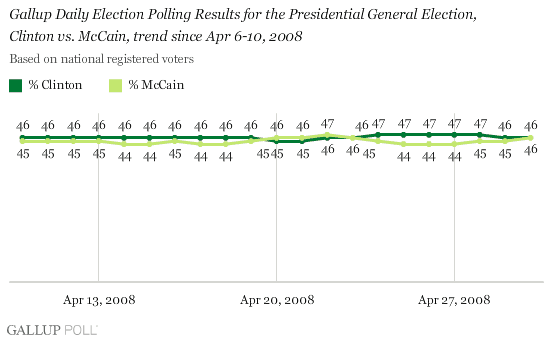
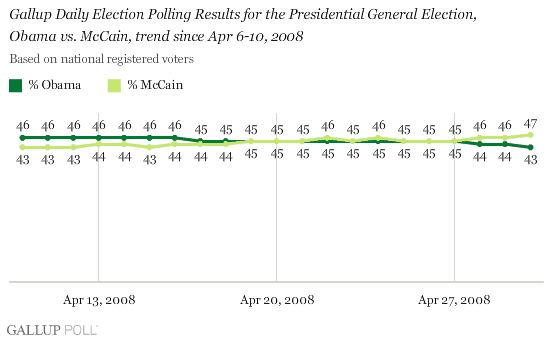
While the broad outlines of voter support for Hillary Clinton and Barack Obama are highly similar -- both candidates attract traditional Democratic constituencies -- there are some differences that could be important in assessing which of the two has the better chance of beating McCain.
A Mostly Traditional Democratic Coalition for Clinton
According to an aggregate of Gallup Poll Daily tracking from April 21-27, including interviews with more than 6,000 registered voters, a Clinton-McCain race looks highly typical of recent elections, with the Democrat widely favored by women, blacks, adults under 30 years of age, Easterners, low socioeconomic Americans (those with low incomes and low education), Catholics, Hispanics, secular Americans, unmarried adults, and Democrats.
Two important differences from recent general elections are Clinton's especially strong performance among women, and her relatively weak performance among black Americans. Her 12-point advantage among women over McCain (52% vs. 40%) contrasts with single-digit advantages among women for John Kerry, Al Gore, and Bill Clinton in the previous three presidential elections. And her 78% level of support from blacks contrasts with more than 90% support among blacks for those candidates. The latter clearly highlights the risk the Democratic Party faces with blacks (the overwhelming majority of whom are Democrats and who support Obama for the Democratic nomination) should Clinton win the nomination on the basis of the superdelegates or some other means that Obama's supporters perceive as unfair or undemocratic.
Also, only 82% of Democrats currently say they would vote for Clinton in the fall, whereas recent Democratic presidential candidates have received no less than 89% of the vote from their party.
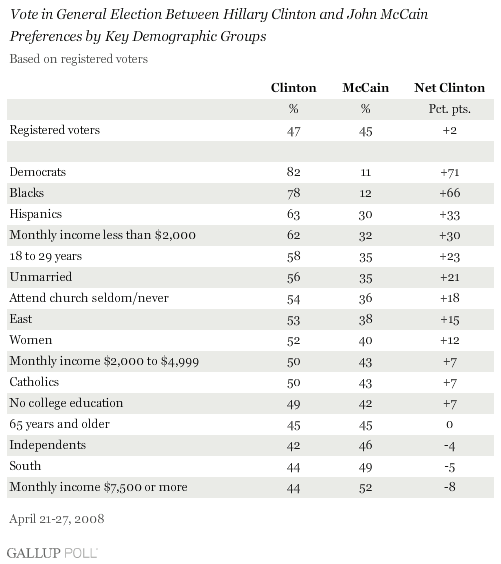
Obama Charting a Different Course
An Obama-McCain race differs from a Clinton-McCain race mainly in terms of degrees of support for the Democrat. Obama beats McCain among nearly all of the aforementioned core Democratic constituencies. But his margin of support is lower among women, Easterners, low-income Americans, Catholics, Hispanics, and self-identified Democrats. (Obama also does less well than Clinton in the South, although both lose to McCain in that region.)
Obama largely offsets these losses by doing better than Clinton among blacks and high-income Americans. He also does slightly better among the one-third or so of voters who consider themselves political independents. Obama's near-universal support among blacks is the more typical pattern for a Democratic presidential candidate than is the lower support Clinton receives.
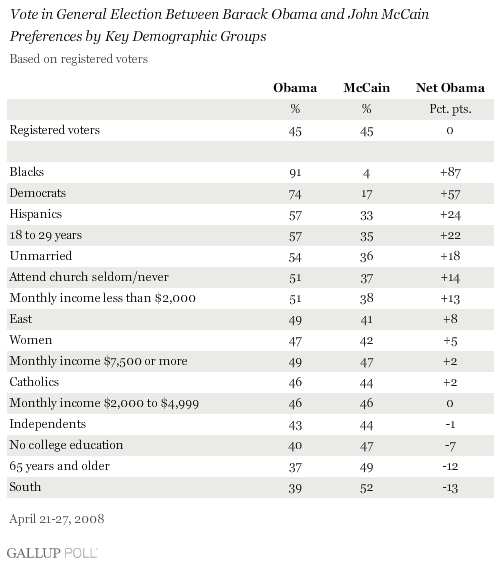
The accompanying table summarizes the differences in support for Clinton and Obama among these groups, highlighting that Clinton performs especially well relative to Obama among Americans of lower and lower-middle incomes, lower education (no college experience), and among Democrats, seniors, and Hispanics. Obama's distinguishing strengths are his stronger performance among blacks and higher-income Americans, although he also performs slightly better among independents.
The most recent weekly aggregate of Gallup Poll Daily tracking finds Clinton doing just as well as Obama among voters aged 18 to 29. However, this is a sharp reversal for Clinton, who had been trailing Obama among young voters for most of March and April, so it is not clear whether the current data are an anomaly or a dramatic shift in younger voters' preferences.
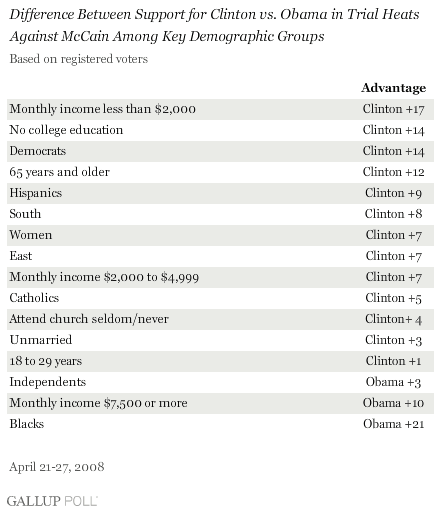
Obama Falls Short Among Conservative Democrats
Given the apparent willingness of many blacks to forsake Clinton in November if she is the Democratic Party's nominee -- either by voting for McCain or not voting at all -- it may seem surprising that Clinton still outperforms Obama among Democrats (82% vs. 74%). The reason for this is Obama's relatively poor performance among conservative Democrats.
Only 62% of Democrats who describe their political views as "conservative" choose Obama in a race between Obama and McCain. By contrast, 74% of conservative Democrats would vote for Clinton in a Clinton vs. McCain race. Obama does just as well as Clinton among liberal Democrats, and nearly as well among moderate Democrats. His great weakness is, and has been since early March, among conservative Democrats.
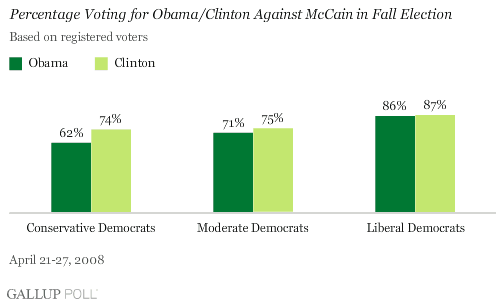
Bottom Line
These observations are made as the protracted battle for the Democratic nomination gets increasingly contentious, and before the eventual nominee has had the opportunity to heal party wounds. Much could change. At present, it seems both Clinton and Obama would win the support of traditional Democratic constituencies in the fall election if they are nominated for president. However, compared with previous Democratic nominees, Clinton seems poised to do historically well among women and less well among blacks. Obama could have trouble holding blue-collar and conservative Democrats, but could make that up if he maintains his strong appeal to blacks and upper-income Americans, and continues to go toe-to-toe with McCain among political independents.
Survey Methods
Results are based on telephone interviews with 6,117 registered voters, aged 18 and older, conducted April 21-27, 2008. For results based on the total sample of registered voters, one can say with 95% confidence that the maximum margin of sampling error is ±1 percentage point.
Interviews are conducted with respondents on land-line telephones (for respondents with a land-line telephone) and cellular phones (for respondents who are cell-phone only).
In addition to sampling error, question wording and practical difficulties in conducting surveys can introduce error or bias into the findings of public opinion polls.
To provide feedback or suggestions about how to improve Gallup.com, please e-mail feedback@gallup.com.
